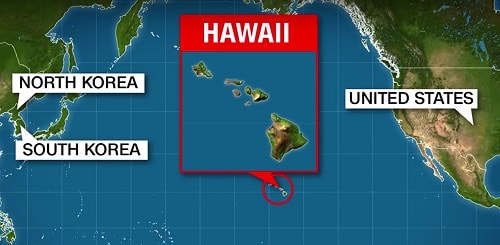Hawaiians panic over false missile alarm
Traffic came to a halt and people fled, taking refuge in bathrooms, after receiving a warning that a missile was about to strike Hawaii.
"Under the mattress in the bathtub with my wife, kids and in-laws. God, please tell me this threat is not real," John Peterson, a golfer staying at the hotel for the tournament, tweeted. Hawaii state Rep. Matt LoPresti also sought refuge in the bathroom. "I'm sitting in the bathtub with my kids praying," he toldCNN.
At around 8am Hawaii time on January 13 (1am January 14 Hanoi time), Hawaii residents received a text message: "Ballistic missile threat is coming to Hawaii. Take shelter immediately. This is not a drill."
The alarm was broadcast on both television and radio, causing traffic to come to a standstill, with people abandoning their cars on highways, shop owners trying to close their shops, and panicked tourists searching for answers on their phones.
The panic lasted about 20 minutes after the tweets and announcements that the alarm was false. But it wasn't until 38 minutes after the false alarm that a second message was sent to phones in Hawaii: "There is no threat or danger to the state of Hawaii. Repeat. False alarm."
A video of a young girl being helped down a drain to take shelter was widely shared on social media. Another video showed a University of Hawaii student running away after receiving a text message.
Gene Park, who works for the Washington Post, posted a text message he received from a friend in Hawaii who was in tears after the false alarm. The father had just dropped his older children off at the airport and stopped at the restaurant when the alarm went off. Fearing that missiles could strike at any moment, he was faced with several options: shelter in place, drive back to the airport to be with his older children, drive to his wife, or go home with his two youngest children. In the end, he decided to go home with his youngest children, even though he “knew there was a good chance he wouldn’t make it.”
Hawaii Governor David Ige apologized, saying an employee pressed the wrong button during a shift change that caused the false alarm. He promised to review the system to ensure the mistake would never happen again.
Hawaii state Sen. Brian Schatz called the incident "inexcusable." "Another false alarm. What happened today was absolutely inexcusable. The entire state was horrified. There needs to be swift accountability and process fixes."
Hawaii last month reactivated its Cold War-era sirens to guard against North Korean missiles, and has stepped up efforts to educate its 1.4 million residents and visitors about how to respond to a nuclear attack through public meetings and broadcasts.
 |
Location Hawaii, Korea. Graphics:CNN. |
